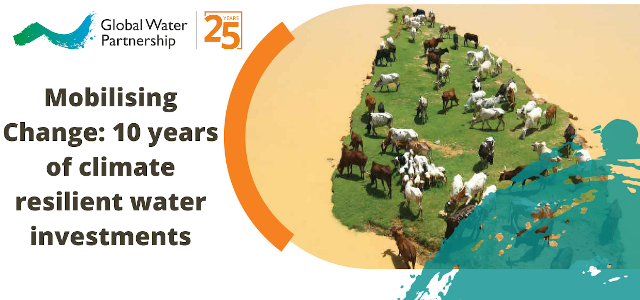This was one of the key messages from the Mobilising Change: 10 years of climate resilient water investments session, convened by Global Water Partnership (GWP), on 26 August 2021, during World Water Week, hosted by the Stockholm International Water Institute.
“The dual problems of the pandemic as well as floods and droughts around the world require a radical collective effort and response by all of us to increase investment in water infrastructure, management, and information,” said Mr. Dario Soto-Abril, Executive Secretary of GWP.
“There are many examples from various GWP regional applications which prove that dramatic gains in climate change adaptation, as well as improvements in water and sanitation, are possible in just a few years and that some of the solutions are inexpensive, effective, and can be deployed quickly,” added Mr. Soto-Abril.
Global Water Partnership is currently working towards mobilising over EUR 10 billion in water-related investments by 2025, from both private and public sources. Strategies on how this would be achieved were discussed from various regional perspectives during the session, moderated by Stacy Swann, CEO: Climate Finance Advisors, and a member of the GWP Global Steering Committee.
GWP’s Chair, Howard Bamsey, said that the challenge would not be to produce new funding, but rather to redirect the investments that are already being made toward climate-resilient water security.
“As the world prepares for COP 26 in November 2021, the lessons from a decade of GWP work reaffirm the relevance of connecting climate and development through water,” said Alex Simalabwi, GWP’s Global Head of Climate Resilience, who has led GWP’s water and climate programme since its inception.
“The priorities driving this work are positioning water-informed insights in national adaptation planning (NAPs), facilitating access to climate finance for resilience-building water projects, and supporting integrated planning for water infrastructure,” added Mr. Simalabwi.
"GWP's track record in supporting water resource and climate resilience investments worth EUR 1.5 billion, representing a leverage ratio of 1:33 for every dollar invested in GWP's water and climate programme over the past 10 years, is a testament to the transformative power of partnerships to create real impact,” said Mr. Simalabwi.
Dr. Youssef Nassef, Director of the Adaptation Division at UNFCCC, called for a greater role of GWP to support the scale-up of adaptation implementation – through offering technical support in the preparation of NAPs, filling knowledge gaps, and acting as a water-specific designated entity to receive funds from the financial mechanisms in the UNFCCC.
“Investments in information and data should be prioritised for products and tools that can benefit as many people as possible,” said Johannes Cullmann, Director of the World Meteorological Organisation’s Climate and Water Department. He also urged partners to increase understanding that NAPs need to be scaled beyond the national perspective to a regional level.
Various applications of mobilising change by linking climate and water were showcased during the session, from various GWP regions.
Prof. Michael Scoullos, Chair of GWP Mediterranean said that GWP was at a critical moment to invest in knowledge, in creativity, and in synergies within the system and with all other partners.
Trevor Thompson, Chair of GWP Caribbean said that the region had undertaken a consultative process with partners from across the region in order to build climate resilience into water projects. This included convening the first Caribbean Science Symposium on Water in 2021.
Fabiola Tabora, Executive Secretary of GWP Central America said that the organisation has successfully influenced the incorporation of a forward-looking drought approach in a regional project, and as a result, six Central American countries had developed drought policies, while regional guidelines were currently under development.
In Central and Eastern Europe, GWP had supported countries to access financing toward climate-resilient water projects by leveraging off strong partnerships that incorporated a wide range of stakeholders. GWP Central and Eastern Europe Senior Project Manager, Sabina Bokal, said that the organisation would continue to support the capacity of partners to apply climate change adaptation to water projects.
